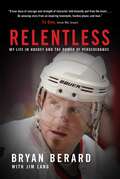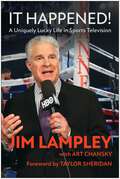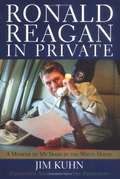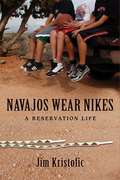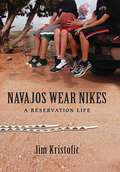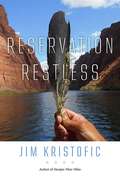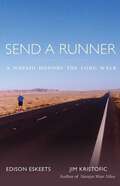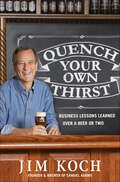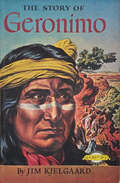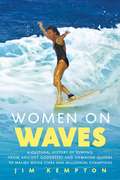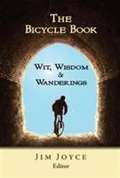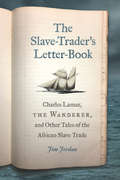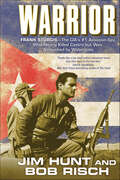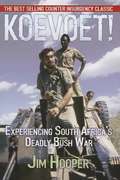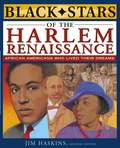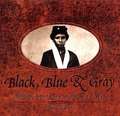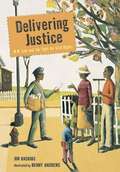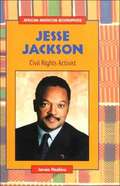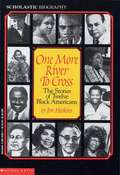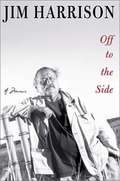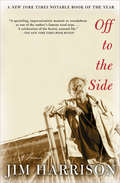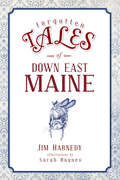- Table View
- List View
Relentless: My Life in Hockey and the Power of Perseverance
by Jim Lang Bryan BerardFormer NHL star Bryan Berard shares the inspiring story of his life on and off the ice—from finding early success in the league and suffering a life-changing eye injury to discovering the inner strength to overcome whatever life threw at him and continue to play the game he loved.&“My career is over,&” I said. &“I&’m never going to play in the NHL again.&” My mom turned to me, a stern look on her face. &“&‘Never&’ does not exist in our family&’s vocabulary.&” On March 11, 2000, Bryan Berard&’s life changed forever. One moment, he was a young hockey star, a former first overall pick and Olympian who had a long, bright career ahead of him. The next, he was writhing on the ice, his eye slashed by a wayward stick. The doctors feared Bryan might lose his eye. It seemed certain that he would never play hockey again. But ever since his childhood, Bryan had refused to believe that anything was impossible. With the support of his family behind him and his own inner determination driving him forward, Bryan not only recovered, but made a triumphant return to the NHL just two years after his injury. It seemed that the worst was behind him. But there were storm clouds on the horizon. Injuries continued to plague him throughout the rest of his career, which saw him move from North America to Russia to continue to play the game he loved. Reports of steroid use cast a shadow over his accomplishments. And then, just as he was about to retire, Berard learned that his long-time financial adviser had defrauded him, several other hockey stars, and others out of millions of dollars in life savings. Despite every setback, though, Berard refused to give up. He nearly lost an eye, but he never lost sight of what was most important in his life. Funny, honest, and inspiring, Berard&’s memoir is a tribute to the resilience and perseverance of the human spirit.
It Happened!: A Uniquely Lucky Life in Sports Television
by Art Chansky Jim LampleyFrom HBO&’s ringside face and voice of boxing, comes a first-person, blow-by-blow account of the evolution of sports television chock full of famous names, history-making events, and never-before-told stories from the world of sports.Jim Lampley&’s story is a 50-year travelog of an unlikely career that catalogs the evolution of sports television—from his emergence as the first sideline reporter, through hosting and covering 14 Olympics, to working with all major sports networks. It Happened! charts Jim&’s notable career, with highlights including: Becoming the first live reporter on the sideline of a nationally televised college football game Following in the footsteps of Jim McKay as host on ABC&’s Wide World of Sports and Howard Cosell as halftime host for ABC&’s Monday Night Football Partnering with ABC, CBS, NBC, Turner, and HBO Ascending to host of HBO&’s Wimbledon weekday telecasts Reaching &“icon&” status as the 30-year face and voice of HBO World Championship Boxing Learn how Jim&’s brilliance as an announcer and his revolutionary nature led to innovations in sportscasting, three sports Emmys, and induction into the International Boxing Hall of Fame. Personal anecdotes and hard-earned lessons combine as Jim digs deep and shares celebrity stories from the upper echelons of superstar athletes and Hollywood hotshots, but also offers an introspective look at his personal life and trials.
Ronald Reagan in Private: A Memoir of My Years in the White House
by Jim KuhnJim Kuhn, President Reagan's executive assistant and author of this book, was one of the very few people privileged to see the Great Communicator (as people often referred to the President)not just during his historic public events, but also behind the scenes, during quiet moments. Kuhn was responsible for helping the most powerful man in the world manage his time and information. His memoir of an unguarded and unedited Ronald Reagan captures the laughter, resolve, sensitivity, and discomforts of the man who won the Cold War and restored America's confidence. President Reagan frequently shared with Kuhn his personal views on matters great and small, including his thoughts about world leaders such as Mikhail Gorbachev and Margaret Thatcher, and controversial issues such as nuclear weapons, taxes, and women's rights. Kuhn recalls many poignant moments that will surprise readers, no matter how much they already know about President Reagan. For example: How the President reacted when staff disappointed him and things didn't go as planned The time he felt distraught over arms negotiations with the Soviets President Reagan's true personal thoughts about abortion What aspersion bothered him more than any other How President Reagan felt about the Iran-Contra scandal and the figures involved During his 13 years of service to Ronald Reagan, Kuhn discovered a man who acted the same off camera as he did in front of the world; who showed the same respect to an anonymous caller to the White House as he did to Pope John Paul II; who was more nuanced and perceptive than the press would ever admit; who never let the power and prestige of the Presidency go to his head. Now that Ronald Reagan has passed away, there is a hunger for a deeper understanding of what made him a great President. Jim Kuhn offers a unique perspective on the private Ronald Reagan that will fascinate his millions of admirers.
Navajos Wear Nikes: A Reservation Life
by Jim KristoficJust before starting second grade, Jim Kristofic moved from Pittsburgh across the country to Ganado, Arizona, when his mother took a job at a hospital on the Navajo Reservation. Navajos Wear Nikes reveals the complexity of modern life on the Navajo Reservation, a world where Anglo and Navajo coexisted in a tenuous truce. After the births of his Navajo half-siblings, Jim and his family moved off the Reservation to an Arizona border town where they struggled to readapt to an Anglo world that no longer felt like home. With tales of gangs and skinwalkers, an Indian Boy Scout troop, a fanatical Sunday school teacher, and the author's own experience of sincere friendships that lead to (beautiful harmony), Kristofic's memoir is an honest portrait of growing up on--and growing to love--the Reservation.
Navajos Wear Nikes: A Reservation Life
by Jim KristoficJust before starting second grade, Jim Kristofic moved from Pittsburgh across the country to Ganado, Arizona, when his mother took a job at a hospital on the Navajo Reservation. Navajos Wear Nikes reveals the complexity of modern life on the Navajo Reservation, a world where Anglo and Navajo coexisted in a tenuous truce. After the births of his Navajo half-siblings, Jim and his family moved off the Reservation to an Arizona border town where they struggled to readapt to an Anglo world that no longer felt like home.With tales of gangs and skinwalkers, an Indian Boy Scout troop, a fanatical Sunday school teacher, and the author&’s own experience of sincere friendships that lead to ho?zho? (beautiful harmony), Kristofic&’s memoir is an honest portrait of growing up on—and growing to love—the Reservation.
Reservation Restless
by Jim Kristofic2021 Southwest Books of the Year Winner of the 2020 New Mexico–Arizona Book Award for Autobiography & Memoir Jim Kristofic shares his story—showing us how to use old traditions to find new beginnings and a better way to live. In the author&’s own words: &“Reservation Restless explores the borders of the world so one can arrive at their own center.&”In the powerful and haunting lands of the Southwest, rainbows grow unexpectedly from the sky, mountain lions roam the desert, and summer storms roll over the Colorado River. As a park ranger, Kristofic explores the Ganado valley, traces the paths of the Anasazi, and finds mythic experiences on sacred mountains that explain the pain and loss promised for every person who decides to love. After reconnecting with his Navajo sister and brother, Kristofic must confront his own nightmares of the Anglo society and the future it has created. When the possible deaths of his mentor and of the American future loom before him, Kristofic must find some new way to live in the world and strike some restless path that will lead back to hózhó—a beautiful harmony.
Send a Runner: A Navajo Honors the Long Walk
by Jim Kristofic Edison EskeetsThe Navajo tribe, the Diné, are the largest tribe in the United States and live across the American Southwest. But over a century ago, they were nearly wiped out by the Long Walk, a forced removal of most of the Diné people to a military-controlled reservation in New Mexico. The summer of 2018 marked the 150th anniversary of the Navajos' return to their homelands. One Navajo family and their community decided to honor that return. Edison Eskeets and his family organized a ceremonial run from Spider Rock in Canyon de Chelly, Arizona, to Santa Fé, New Mexico, in order to deliver a message and to honor the survivors of the Long Walk.Both exhilarating and punishing, Send A Runner tells the story of a Navajo family using the power of running to honor their ancestors and the power of history to explain why the Long Walk happened. From these forces, they might also seek the vision of how the Diné—their people—will have a future.
Quench Your Own Thirst: Business Lessons Learned Over a Beer or Two
by Jim KochNATIONAL BESTSELLER and named a 2016 Best Book of the Year by Inc., Business Insider, and ForbesFounder of The Boston Beer Company, brewer of Samuel Adams Boston Lager, and a key catalyst of the American craft beer revolution, Jim Koch offers his unique perspective when it comes to business, beer, and turning your passion into a successful company or career.“Boston Beer’s Jim Koch offers readers a six-pack of wisdom.” – The Boston GlobePull up a chair and crack open a Sam Adams. It’s time to leave behind business as you know it.Quench Your Own Thirst covers everything from finding your own Yoda to Koch’s theory on how a piece of string can teach you the most important lesson you’ll ever learn about business. Koch also has surprising advice on sales, marketing, hiring, and company culture. His anecdotes, quirky musings, and bits of wisdom go far beyond brewing. A fun, engaging guide for building a career or launching a successful business, Quench Your Own Thirst is the key to the ultimate dream: being successful while doing what you love. So, are you quenching you own thirst – or someone else’s? "Like Steve Jobs, Bill Gates, Larry Ellison, and the other greats, Jim Koch's entrepreneurial journey is motivated by a deep commitment to making superb products and building a unique culture that reinforces innovation and risk-taking. This book tells a compelling story about how he did it. The lessons will be invaluable for anyone starting a business or building a career." —Bill Hambrecht, co-founder or Hambrecht & Quist and chairman of WRHambrecht + Co
Slackjaw
by Jim KnipfelIt wasn't until he was in his early twenties that doctors discovered that Jim Knipfel's nearsightedness was the result of an untreatable rare genetic eye disease known as retinitis pigmentosa, which, they said, would leave him blind within a few short years.
The Explorations of Pere Marquette
by Jim KjelgaardThis book presents the adventures of a real hero, greater than those created by fiction.
The Story of Geronimo
by Jim KjelgaardA biography for teenagers of the Apache leader Geronimo (1829-1909), written in the style of a novel.
Women on Waves: A Culture History of Surfing—From Ancient Goddesses and Hawaiian Queens to Malibu Movie Stars and Millennial Champions
by Jim KemptonA captivating look at two centuries of surfing—"the Sport of Queens"—from Native Hawaiian royalty to the breakout style and jaw-dropping feats on the waves today.Few subjects in the world of sports and or the outdoors is more timely or compelling than women&’s surfing. From smart, strong, fearless women shattering records on 80-foot waves to professional athletes fighting for equal pay and a more fair and just playing field, these amazing, wave-riding warriors provide an inspirational and aspirational cast of powerful role models for women (and men) across all backgrounds and generations. Over the past two-hundred years, and especially the past five decades, the surfing lifestyle have become the envy of people around the world. The perception of sun, sand, surf, strong young women and their inimitable style, has created a booming lifestyle and sports industry—and the sport that is set to make it&’s Olympic exhibition debut in Tokyo 2021. A massive shift from when colonizers tried to extinguish all traces of Native Hawaiian surfing and its sacred culture. What is it about the surfing that intrigues people of all ages, from all corners of the world? The beaches and idyllic locations? The unique style and mystique that surfers project? These women, on the beach and riding giant waves, or in the media, have made their mark on not just their sport, but our wider culture. Women on Waves is filled with phenomenal athletic performance, breakthrough female achievements, and plenty of inspiration and fun to see us through until the time when we can all hit the surf once more! Spanning a millennia, From Hawaii to Malibu, New York to Australia, South Africa to the South Pacific and beyond, Jim Kempton presents a fascinating new narrative that will captivate anyone who loves sports and the outdoors.
The Bicycle Book: Wit, Wisdom, & Wanderings
by Jim JoyceCollection of essays from biking enthusiasts.
The Slave-Trader's Letter-Book: Charles Lamar, The Wanderer, and Other Tales of the African Slave Trade (UnCivil Wars)
by Jim JordanLong-lost letters tell the story of an illegal slave shipment, a desperate Savannah businessman, and the lead-up to the Civil War. In 1858 Savannah businessman Charles Lamar, in violation of U.S. law, organized the shipment of hundreds of Africans on the luxury yacht Wanderer to Jekyll Island, Georgia. The four hundred survivors of the Middle Passage were sold into bondage. This was the first successful documented slave landing in the United States in about four decades, and it shocked a nation already on the path to civil war. Nearly thirty years later, the North American Review published excerpts from thirty of Lamar&’s letters, reportedly taken from his letter book, which describe his criminal activities. However, the authenticity of the letters was in doubt until very recently. In the twenty-first century, researcher Jim Jordan found a cache of private papers belonging to Charles Lamar&’s father, stored for decades in an attic in New Jersey. Among the documents was Charles Lamar&’s letter book—confirming him as the author. The first part of this book recounts the flamboyant and reckless life of Lamar himself, including involvement in southern secession, the slave trade, and a plot to overthrow the government of Cuba. A portrait emerges at odds with Lamar's previous image as a savvy entrepreneur and principled rebel. Instead, we see a man who was often broke and whose volatility sabotaged him at every turn. His involvement in the slave trade was driven more by financial desperation than southern defiance. The second part presents the &“Slave-Trader's Letter-Book.&” Together with annotations, these seventy long-lost letters shed light on the lead-up to the Civil War from the remarkable perspective of a troubled, and troubling, figure.
Warrior: Frank Sturgis—The CIA's #1 Assassin-Spy, Who Nearly Killed Castro but Was Ambushed by Watergate
by Jim Hunt Bob RischThe press called him a "real-life James Bond." Fidel Castro called him "the most dangerous CIA agent." History remembers him as a Watergate burglar, yet the Watergate break-in was his least perilous mission.Frank Sturgis--using more than 30 aliases and code names--trained guerilla armies in 12 countries on three continents and spearheaded assassination plots to overthrow foreign governments including those of Cuba, Panama, Guatemala, the Dominican Republic, and Haiti. Warrior follows the shocking, often unbelievable adventures of Sturgis, brought to life by his nephew, Jim Hunt, who lived with Sturgis, and his co-writer, Bob Risch. Also included are never-before-seen personal photos of Sturgis and his compatriots.Frank Sturgis was well-versed in a life of shadows: familiar to world leaders and underground kingpins, to spies and couterspies...Warrior is his story.At the Publisher's request, this title is being sold without Digital Rights Management Software (DRM) applied.
Koevoet: Experiencing South Africa's Deadly Bush War
by Jim Hooper<p>Koevoet! has been an global bestseller since its release over 20 years ago. This new edition goes far beyond the original in capturing the courage, fear and intensity of South Africa's deadly bush war. Never before had an outsider been given unrestricted access to Koevoet, the elite South West African Police counterinsurgency unit - also known as Operation K and officially as the South West Africa Police Counter Insurgency Unit (SWAPOL-COIN). Author Jim Hooper spent a total of five months embedded with the semi-secret and predominantly black 'Ops K', which climaxed with one of the most vicious and determined infiltrations ever mounted by the communist-backed South West Africa People s Organization (SWAPO). Crossing regularly into Angola in pursuit of the insurgents, he saw friends die next to him and was twice wounded himself. <p>This updated edition, drawing on the recollections and diaries of the men he rode with, will fascinate yet another generation of readers. In assembling this work, Jim Hooper had the opportunity to re-connect with so many of the men who allowed this outsider to ride with them. All of which brought a new intensity and poignancy. It also reminded Jim Hooper how privileged he was to have been witness to Koevoet's war. This stunning work is a tribute to Koevoet and the legend they created.</p>
Black Stars of the Harlem Renaissance
by Jim Haskins Eleanora E. Tate Clinton Cox Brenda WilkinsonAfrican American history comes to life. Discover why young people all over the country are reading the Black Stars biographies of African American heroes. Here is what you want to know about the lives of great black men and women during the fabulous Harlem Renaissance: louis "satchmo" armstrong, eubie blake, thomas andrew dorsey, w. e. b. du bois, duke ellington, james reese, europe jessie, redmon fauset, marcus garvey, w. c. handy, fletcher henderson, langston hughes, zora neale hurston, hall johnson, henry johnson, oscar micheaux, philip payton jr., gertrude "ma" rainey, paul robeson, augusta savage, noble sissle, bessie smith, james van der zee, dorothy west, carter g. woodson. "The books in the Black Stars series are the types of books that would have really captivated me as a kid." -Earl G. Graves, Black Enterprise magazine. "Inspiring stories that demonstrate what can happen when ingenuity and tenacity are paired with courage and hard work." -Black Books Galore! Guide to Great African American Children's Books. "Haskins has chosen his subjects well... catching a sense of the enormous obstacles they had to overcome... Some names are familiar, but most are little-known whom Haskins elevates to their rightful place in history." -Booklist. "The broad coverage makes this an unusual resource-- a jumping-off point for deeper studies." -Horn Book.
Black, Blue, and Gray: African Americans in the Civil War
by Jim HaskinsFour-time Coretta Scott King Honor Award winner Jim Haskins brings readers face-to-face with the African Americans who fought in the war between the states. Excerpts from letters and government documents introduce the names and places that set the stage for the war's unfolding. Vintage photographs offer a vivid look at the brave soldiers who risked their lives in the fight for human equality [This text is listed as an example that meets Common Core Standards in English language arts in grades 9-10 at http://www.corestandards.org.]
Delivering Justice: W. W. Law and the Fight for Civil Rights
by Jim HaskinsA respected biographer teams up with an acclaimed artist to tell the story of the mail carrier who orchestrated the Great Savannah Boycott -- and was instrumental in bringing equality to his community. "Grow up and be somebody," Westley Wallace Law's grandmother encouraged him as a young boy living in poverty in segregated Savannah, Georgia. Determined to make a difference in his community, W.W. Law assisted blacks in registering to vote, joined the NAACP and trained protesters in the use of nonviolent civil disobedience, and, in 1961, led the Great Savannah Boycott. In that famous protest, blacks refused to shop in downtown Savannah. When city leaders finally agreed to declare all of its citizens equal, Savannah became the first city in the south to end racial discrimination. A lifelong mail carrier for the U.S. Postal Service, W.W. Law saw fostering communication between blacks and whites as a fundamental part of his job. As this affecting biography makes clear, this "unsung hero" delivered far more than the mail to the citizens of the city he loved.
Jesse Jackson: Civil Rights Activist
by Jim HaskinsPresents the life, accomplishments, and goals of the civil rights activist and politician Jesse Jackson, from his childhood in North Carolina through his years in Chicago and Washington, D.C.
One More River To Cross: The Stories Of Twelve Black Americans
by Jim HaskinsPresents brief biographies of twelve African Americans who courageously fought against racism to become leaders in their fields, including Marian Anderson, Ralph Bunche, Fannie Lou Hamer, and Malcolm X.
Shirley Temple Black: Actress to Ambassador (Women of Our Time)
by Jim HaskinsShirley Temple, "America's Sweetheart," was the most popular movie star of the 1930s. During the Great Depression, her bubbly personality, blond curls, and dimples helped Americans forget their own hard times. As an adult, she entered politics, serving as the first woman Chief of Protocol at the White House; she went on to become the U.S. delegate to the United Nations and then Ambassador to Ghana. Today she remains active in many causes and is a well-know political figure -- cherished by millions as their favorite child star.
Off to the Side: A Memoir
by Jim HarrisonFrom the book jacket: For nearly forty years Jim Harrison has been one of America's most beloved writers, a literary giant who has given us American classics like Dalva, Legends of the Fall, and The Road Home. And he is perhaps just as loved for the spirit from which he writes-devoted to the senses, staunchly unpretentious, and ever mindful of the dangers of straying too far from our origins. It is this spirit of which The Oregonian wrote, "The magic of writing as good as Harrison's is that it can bridge the gulf of human separation." Now, for the first time, Jim Harrison has put pen to paper to write about his own life-a life that he captures with a riveting directness and a delightful, resonant music.
Off to the Side: A Memoir
by Jim HarrisonSelected as a New York Times Notable Book of the Year, Off to the Side is the tale of one of America's most beloved writers. Jim Harrison traces his upbringing in Michigan amid the austerities of the Depression and the Second World War, and the seemingly greater austerities of his starchy Swedish forebears. He chronicles his coming-of-age, from a boy drunk with books to a young man making his way among fellow writers he deeply admires—including Peter Matthiessen, Robert Lowell, W.H. Auden, Truman Capote, Tennessee Williams, and Allen Ginsberg. Harrison discusses forthrightly the life-changing experience of becoming a father, and the minor cognitive dissonance that ensued when this boy from the heartland somehow ended up a highly paid Hollywood screenwriter. He gives free rein to his seven obsessions—alcohol, food, stripping, hunting and fishing (and the dogs who have accompanied him in both), religion, the road, and our place in the natural world—which he elucidates with earthy wisdom and an elegant sense of connectedness. Off to the Side is a work of great beauty and importance, a triumphant achievement that captures the writing life and brings all of us clues for living.
Forgotten Tales of Down East Maine (Forgotten Tales)
by Jim HarnedyMaine has a collection of unique characters and tales that has helped to shape its identity. Uncover the state's hidden gems with stories like the Midas Scam in Lubec, which left investors with little but salt water to show for their investment. Meet the Artist Who Played Robin Hood, the Hermit of North Pond and the Mysterious Billy Smith. From the tragedy of the Wreck of the Circus Ship to the uplifting story of the Schoolgirl Ambassador, Maine author and veteran storyteller Jim Harnedy brings out the offbeat characters and events that have made the Pine Tree State so unique.
